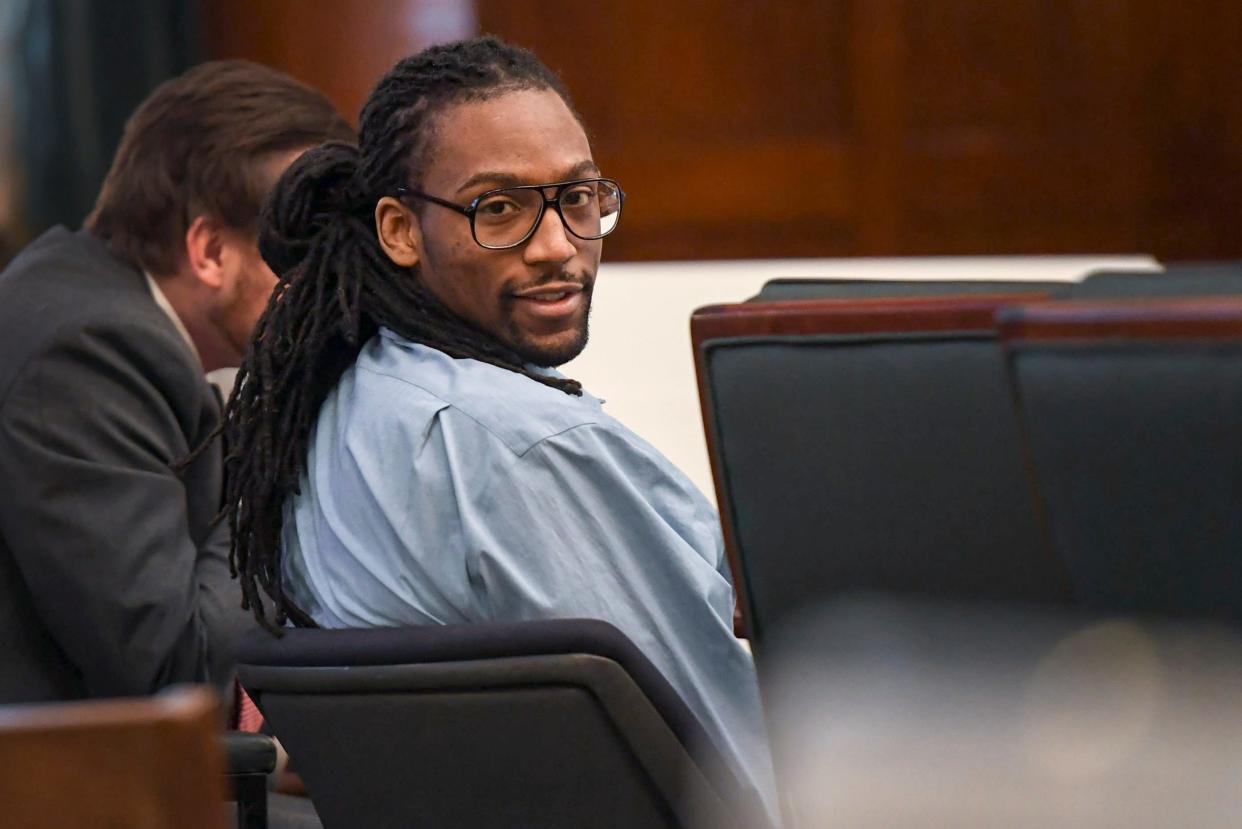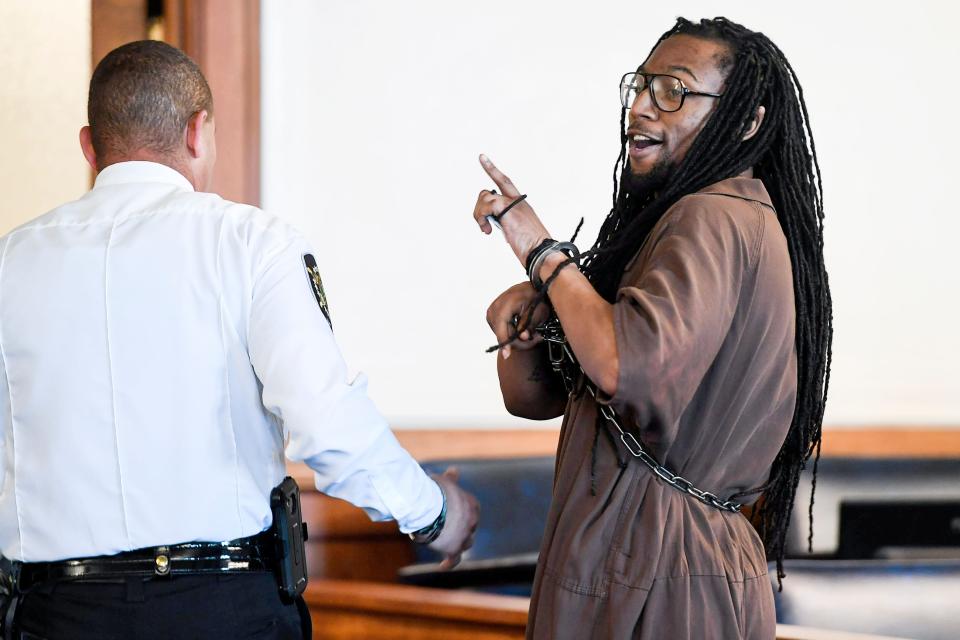N.C. Court of Appeals upholds convictions, life sentence for murder of Candace Pickens

ASHEVILLE — Seven years after Candace Pickens was shot and killed in a North Asheville park, the North Carolina Court of Appeals has upheld the conviction of the man who received an automatic life sentence for her murder.
On July 16, 2019, a Buncombe County jury found Nathaniel Dixon guilty of killing Pickens, his 22-year-old pregnant girlfriend, and shooting her toddler son in the face. Dixon, 27 at the time, was found guilty of first-degree murder, attempted first-degree murder and malicious maiming, and was acquitted of murder of an unborn child and child abuse while inflicting serious injury.
The jurors, all of whom were white, deliberated for about nine hours over two days, the Citizen Times previously reported. On top of a life sentence, Superior Court Judge Greg Horne sentenced Dixon, who is Black, to 207-261 months for the attempted murder of 3-year-old Zachaeus; and 96-128 months for the malicious maiming charge.
Dixon is currently being held in the Tabor Correctional Institution in Tabor City.
Dixon’s trial – which lasted over two months – saw the dismissal of several jurors, the killing of a state witness and the eventual dropping of a death penalty pursuit, according to Citizen Times reporting.
Following the verdict, Dixon filed an appeal of his conviction, alleging that the state showed racial discrimination during jury selection and that the trial court abused its discretion by denying his motions for mistrial, according to court documents obtained by the Citizen Times.
However, the N.C. Court of Appeals found no error in the trial, upholding Dixon’s conviction, according to a slip opinion written by Judge Hunter Murphy and filed Dec. 5. The case was originally heard in the Court of Appeals on Sept. 20, 2022.
Candace Pickens Memorial Park: Rebuild starts in N. Asheville for Candace Pickens Memorial Park, named for murdered woman
Dixon's conviction: Nathaniel Dixon found guilty of 2016 murder of Candace Pickens, acquitted of 2 charges
Prosecutors said Dixon twice shot Pickens and then shot Zachaeus once on May 11, 2016, at the former Ira B. Jones Park. He was upset that Pickens, who was in her first trimester of pregnancy, had not agreed to get an abortion, Assistant District Attorney Doug Edwards said in opening statements. Dixon was believed to be the father.
Pickens and her son were found by a jogger about seven hours later. Officials believe that Pickens died almost immediately following the second shot, which penetrated her brain stem, the Citizen Times previously reported.
Zachaeus, who was found unresponsive with a gunshot wound to the face, flinched when a medical official touched him. He was transported to Mission Hospital for surgery, ultimately losing his left eye and suffering a traumatic brain injury but surviving.
What was the opinion of the N.C. Court of Appeals?
In a trial, both the prosecuting and defending attorneys have the right to reject a certain number of potential jurors during jury selection without needing to state a reason.
In Dixon’s case, the state rejected one of only two Black prospective jurors, who expressed reservations about the death penalty. At the time, District Attorney Todd Williams was pursuing the death penalty against Dixon. Williams later dropped this pursuit, with court documents filed after the trial’s verdict stating his office “elects to proceed non-capitally.”
“Personally, I have reservations about the death penalty,” said the potential juror, identified as R.D., according to the court document. “Simply because (it’s) disproportionate. Most people who know anything about the death penalty know that statistics show that African Americans receive it more than others. You know, this is weighing on me quite a bit.”
Though the potential juror stated that his feelings about the death penalty wouldn’t substantially impair his ability to vote on whether to impose one in this case, the state decided to reject this certain juror.

Death penalty dropped: DA no longer pursuing death penalty for Dixon, decision backed by Pickens' family
In its summary opinion, the court of appeals stated: “We are not persuaded that the State’s peremptory strike of one of only two African American prospective jurors in the jury pool was motivated by discriminatory intent, even where the State made a greater effort to rehabilitate other jurors who expressed reservations about the death penalty, because we cannot be confident the trial court was mistaken in its conclusion that reservations about the death penalty still explained the exercise of the strike.”
Three mistrial motions were raised by defense attorney Jack Stewart and Capital Defender Victoria Jayne during the trial. One of these motions was prompted in part by the death of 24-year-old Tiyquasha Antwonique Simuel, who testified under a subpoena for the state two weeks before she was found with multiple gunshot wounds.
After her death, Williams issued a press release identifying the victim and her involvement in the case. The release stated the court had “issued appropriate orders to protect individuals who are involved with the trial to ensure proceedings may safely continue,” according to the court document.
State's witness found dead: Pregnant woman killed in shooting was witness in high-profile Nathaniel Dixon murder trial
One juror became aware of this press release and was excused from the trial, expressing safety concerns stemming from Simuel’s death. In response, the defense made a motion for a mistrial, which was denied.
Another juror later sent a text message to the clerk during trial after he used his cell phone and “inadvertently saw a headline, not the full details of an independent news broadcast,” about Simuel’s death, according to the court document.
The juror “unequivocally denied that the information regarding the death of the State’s witness impaired his ability to be fair and impartial,” the ruling said.
Two days after the jury reached its verdict, the defense became aware that the second juror knew about Simuel’s shooting death and once again moved for a mistrial, which was denied.
In the appealed case, the defendant alleged that the trial court abused its discretion by denying his motions for mistrial. However, the appeals court found that the court’s ruling did “not rise to the level of an abuse of discretion.”
Ryley Ober is the Public Safety Reporter for Asheville Citizen Times, part of the USA Today Network. Email her at rober@gannett.com and follow her on Twitter @ryleyober
This article originally appeared on Asheville Citizen Times: High-profile Asheville murder conviction upheld by NC Court of Appeals

